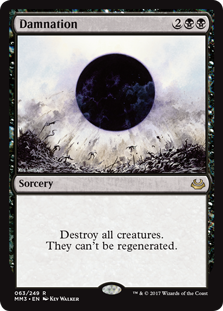Uncompetitive Spirit — Pentagram
You all know how it goes. You make the calls. You put the brews (or soda) in the fridge. You set the stage and make room around the kitchen table for yourself and three other powerful mages. And then four show up. So what do you do? You could just go ahead and play EDH as planned but with five players instead of four. However, as many of us are painfully aware, games of EDH tend to drag on when there are more than four players at the table. Anything beyond that seems to boil down to Wrath of God effects every other turn because someone felt threatened, and the game doesn't really progress.

I am here, bringing the Uncompetitive Spirit in order to help you with this issue. Today, I'm going to present and discuss a variant of EDH. I will go over the rules differences in question and discuss the variant's basic strategies. Finally, I will open up the Uncompetitive Arena and throw in a popular commander with a deck generated by EDHREC and analyze how that commander with that deck would fare in this variant. Today we're discussing Pentagram, also known as Pentagon, Star, and Five-Point, depending on your play group. I should note, as a teacher in religious studies, that Pentagrams are used in a variety of religions and denominations and isn't inherently satanic or demonic - no matter what your Sunday school teacher tells you.
Pentagram: the Basics

Pentagram is a variant of regular free-for-all EDH. The rules vary slightly depending on your setting, but I will try and keep it as vanilla as possible and explain if there are any variants to the variant. In essence, it can be easily described by using the back of a Magic card, which feature the color wheel. Each player sits around the table ideally positioned like the different colors on the back. The players opposite from your own seat are your enemies. The players next to you are your allies. This is like the color wheel works within the lore as well - white is ally with green and blue, and enemy with black and red. In this case, the player in the white position will win the game immediately when the players in the black position and the player in the red position are eliminated. The blue player will win when the red and the green players are eliminated and so on.
This inherently makes Pentagram a potentially much faster way to play five player EDH - since only two players need to be eliminated for a game to end. Mind you, this of course doesn't always hold true, but I will get into details later on.
For game purposes every other player is treated as an opponent. This means that if you cast Syphon Mind each other player will discard a card and the caster draws for everyone, not just the enemy players opposite that player. Spells can target any legal permanent on the battlefield and any spells on the stack, there's no restrictions on what you can blow up. Attacking seems to be a point of controversy within this variant, some groups allow you to attack your allies, some don't. Mine usually don't, and this has effects on the games obviously. I will discuss this difference later on as well.
Originally, proper Pentagram was played with mono-colored decks of the appropriate color, meaning the white position player played mono-white, the blue position player played mono-blue and so on. This is really flavorful and pretty cool, but I've found this variant to work just fine with regular EDH decks as well. Once my group devoted a night to play with the then-new Commander 2014 decks using the Planeswalker commanders to lead their mono-colored decks to victory, and those were fun but very grindy games. We play with whatever we like and roll for seatings for each game.
If only two players are left in the game - say for example that in a game the white player is removed first, followed by the black player, followed by the blue player. This means that both the red player and the green player will meet their victory condition at the same time. Naturally, there aren't any official rules to judge what happens in this case - in my group we usually declare both players winners and the game ends, but there's nothing stopping your own group from having the two remaining players throwing off the gloves and duking it out heads-up style.
Tactics and other tips
Pentagram, while being a quicker way to play five-player games, can sometimes go awry with table politics. To start off with, the variant comes with two inherent frustrations, both rather likely to happen over the course of a game: becoming the one target for both your enemies, or having both your allies (who are enemies with each other) duking it out while you sit by and watch your enemies benefit from the progression.
I can't stress enough what a boon it is to have a healthy ally with a working active alliance with yourself. To promote this, I often advocate a lot of table talk. You will have an ally taking his or her turn before you, and one ally taking his or her turn after you. Plan accordingly. If you plan to board wipe during your turn to save you from an onslaught from your enemies, let your allies know before you cast the spell. They might disapprove, but I guarantee that they will be less likely to frown if they're warned in advance. Board wipes can also be used as both offensive and defensive bargaining chips, even more so than in regular EDH. Refrain from casting them if an ally asks you not to, but don't be afraid to leverage that to get them to help you with whatever problem you were planning to use your Damnation against.
Since you have fewer proper opponents than in regular EDH, it might be tempting to go after one or even both of your opponents as soon as possible. Come crashing out of the gates, blazing into combat with Prossh, Skyraider of Kher eating all his minions before getting Berserk'd, leaving nothing but a pair of smoking boots left as a memory of your opponent. However, as we all know this can be unwise in regular EDH - spending all your marbles on a single kill will probably lose you the game in the long run - since the other two players will have more resources than you and will be able to either take you out of the game outright, or at least defend themselves properly.
Another really interesting part about Pentagram is how the dynamics change once a player is eliminated. Imagine a game where the blue player has just eliminated the green player. The blue player is now only one elimination away from victory - he or she needs to make sure the red player is eliminated. However, the black player is also only one elimination away from victory - he or se needs to eliminate the white player to win. On the other hand, both the red player and the white player have lost an ally, so they are really on the back foot. This muddles the previous alliances by quite a bit, and it's in this part of the game where your deck really needs to be able to interact. It might be that the white player in this case will have to use resources in order to prevent the blue player from eliminating the red player - despite the fact that the white player is an enemy of the red player. The white player, after all, has to eliminate the black player first, before he or she can go after the red player. It's situations like these that make for interesting and memorable games of pentagram!
Uncompetitive Arena: Gishath, Sun's Avatar
It's time to let a new commander step into the Uncompetitive Arena! This week, I've elected to take a look at Gishath, Sun's Avatar! This is the deck generated by EDHREC's Average Deck mechanic:
I chose Gishath, Sun's Avatar because he's new and relevant, but mostly because of dinosaurs. With Ixalan, I'm pretty sure Wizards just looked in my old note books from secondary school and mashed up everything in my "Things I like" column - Magic, Pirates, and Dinosaurs.
This average deck doesn't really seem very optimized, however. The commander is very scary for sure, and this will likely attract some heat in a game of Pentagram that you must manage. It's very likely that the dinosaurs can come out strong in a game and take an opponent out if left unopposed. This leads to a lot of strange situations, however, as your allies will scramble to throw wrenches in the dino machinery before you're able to steal the game. It's all fine and well to play aggressive-style decks in Pentagram, but just as with regular EDH, they have to be played with care. Over-extending into a board wipe is always bad, and it feels even worse coming from an ally.
Further, the deck is largely unable to interact with the rest of the table's boards in constructive ways. Swords to Plowshares and Path to Exile are obligatory spells for any white deck, and together with Naya Charm they also constitute the deck's only spot removal. The deck is also lacking in sweepers - Star of Extinction is the only proper sweeper. Pyrohemia can work in a pinch, but is mana-intensive, and probably best used to enable Enrage and kill tokens and utility creatures.
To remedy this deck and make it a little easier to play in Pentagram, I'd look at adding more flexible spot removal and more sweepers. EDHREC's top red cards contain great things for the deck in the top three slots - Blasphemous Act, Chaos Warp, and Vandalblast are all great cards and should be in the deck. The fifth most commonly used green card is Beast Within, another card that can remove almost any problematic permanent and creates a token which Gishsath, Sun's Avatar finds largely irrelevant. Lastly, white's fifth most commonly used card is Wrath of God, with good reason. It also belongs in the deck, despite the fact that you're playing a lot of creatures. Even in creature-heavy decks, I like to play at least four sweepers. Wrath of God and probably Day of Judgement or Austere Command would add more interaction which could be useful in Pentagram.
Closing words
Pentagram is a fun, fast way to play five-player EDH most of the time. The intrinsic allies and enemies in the format creates tension throughout the game, and it's relevant from the very first turn of the game to the last. I highly recommend it to any group if five players who are looking to either mix things up, or make a game take shorter than two hours, or both. The variant's rules are very easy to explain and understand, but they make for several nuances in every game which are easy to appreciate.
It's great fun, seasoned with a few elements of frustration - just like any other good EDH game.
Your opinions are welcome. We love hearing what you think about Magic! We ask that you are always respectful when commenting. Please keep in mind how your comments could be interpreted by others. Personal attacks on our writers or other commenters will not be tolerated. Your comments may be removed if your language could be interpreted as aggressive or disrespectful. You may also be banned from writing further comments.
